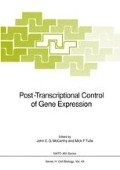Abstract
Many organisms face the challenge of a changing environment. Individual cells in a multicellular organism face similar challenges. To cope with this, cells and organisms have developed the ability to mount transient responses in which subsets of genes appropriate to current conditions are activated for an appropriate time. One particularly well studied example of a transient response is provided by the heat-shock response (for general reviews see Lindquist, 1986; Lindquist and Craig, 1988). This induction of a small number of highly conserved proteins (known as the heat shock proteins or hsps) occurs when cultured cells or whole organisms are exposed to temperatures above their normal growth range. When the cells or organisms are returned to normal temperatures normal patterns of synthesis are restored.
Access this chapter
Tax calculation will be finalised at checkout
Purchases are for personal use only
Preview
Unable to display preview. Download preview PDF.
References
Ashburner M (1970) The genetic analysis of puffing in polytene chromosomes of Drosophila. Proc Roy Soc London B 176: 319–327
Domenico BJ, Bugaisky GE, Lindquist S (1982a) The heat shock response is self- regulated at both the transcriptional and posttranscriptional levels. Cell 31: 593– 603
DiDomenico BJ,Bugaisky GE, Lindquist S (1982b) Heat shock and recovery are mediated by different translational mechanisms. Proc Natl Acad Sei USA 79: 6181–6185
Findly RC, Pederson T (1981) Regulated transcription of the genes for actin and heat-shock proteins in cultured Drosophila cells. J Cell Biol 88: 323–328
Hultmark D, Kiemenz R, Gehring W (1986) Translational and transcriptional control elements in the untranslated leader of the heat-shock gene hsp22. Cell 44: 429– 438
Kiemenz R, Hultmark D, Gehring W (1985) Selective translation of heat shock mRNA in Drosophila melanogaster depends on sequence information in the leader. EMBO J 4: 2053–2060
Lindquist S (1980) Varying patterns of protein synthesis in Drosophila during heat shock: implications for regulation. Dev Biol 77: 463–469
Lindquist S (1981) Regulation of protein synthesis during heat shock. Nature (London) 294, 311–314
Lindquist S and Di Domenico B (1985) Coordinate and Noncoordinate Gene Expression During Heat Shock: A Model for Regulation. New York: Academic Press
Lindquist S (1986) The Heat-shock Response. Ann Rev Biochem 55: 1151–1191
Lindquist S, McGarry T, Golic K (1988) Use of antisense RNA in studies of the heat shock response. In: Melton DA (ed) Current Communications in Molecular Biology: Antisense RNA and DNA, Cold Spring Harbor Laboratory, Cold Spring Harbor, New York, p 71
Lindquist S, Craig EA (1988) The heat-shock proteins. Ann Rev Genet 22:631– 677
McGarry T, Lindquist S (1986) Inhibition of heat shock protein synthesis by heat-inducible antisense RNA. Proc Natl Acad Sei USA 83: 399– 403
McGarry TJ, Lindquist SL (1985) The preferential translation of Drosophila hsp70 mRNA requires sequences in the untranslated leader. Cell 42: 903–911
McKenzie SL (1976) Protein and RNA synthesis induced by heat in Drosophila. Ph.D. thesis Harvard University
Petersen N, Mitchell HK (1981) Recovery of protein synthesis following heat shock; pre-heat treatment affects mRNA translation. Proc Natl Acad Sei USA 78: 1708–1711
Petersen R, Lindquist S (1988) The Drosophila hsp70 message is rapidly degraded at normal temperatures and stabilized by heat shock. Gene 72: 161– 168
Petersen RB, Lindquist S (1989) Regulation of hsp70 synthesis by messenger RNA degradation. Cell Reg 1: 135–149
Rossi J (1988). Investigations Into the Function of Heat Shock Proteins. Ph.D. Thesis, University of Chicago
Sadis S, Hickey E, Weber LA (1988) Effect of heat shock on RNA metabolism in HeLa cells. J Cell Physiol 135: 377– 386
Sanchez Y, Lindquist S (to be published) Hspl04 is required for induced thermotolerance. Science
Simcox AA, Cheney CM, Hoffman EP, Shearn A (1985) A deletion of the 3′ end of the Drosophila melanogaster HSP70 gene increases stability of mutant RNA during recovery from heat shock. Mol Cell Biol 5: 3397– 3402
Storti RV, Scott MP, Rich A, Pardue ML (1980) Translational control of protein synthesis in response to heat shock in D. melanogaster cells. Cell 22: 825–834
Theodorakis NG, Morimoto RI (1987) Posttranscriptional regulation of hsp70 expression in human cells: effects of heat shock, inhibition of protein synthesis, and adenovirus infection on translation and mRNA stability. Mol Cell Biol 7: 4357– 4368
Author information
Authors and Affiliations
Editor information
Editors and Affiliations
Rights and permissions
Copyright information
© 1990 Springer-Verlag Berlin Heidelberg
About this paper
Cite this paper
Petersen, R.B., Lindquist, S. (1990). Differential mRNA Stability: A Regulatory Strategy for Hsp70 Synthesis. In: McCarthy, J.E.G., Tuite, M.F. (eds) Post-Transcriptional Control of Gene Expression. NATO ASI Series, vol 49. Springer, Berlin, Heidelberg. https://doi.org/10.1007/978-3-642-75139-4_9
Download citation
DOI: https://doi.org/10.1007/978-3-642-75139-4_9
Publisher Name: Springer, Berlin, Heidelberg
Print ISBN: 978-3-642-75141-7
Online ISBN: 978-3-642-75139-4
eBook Packages: Springer Book Archive

